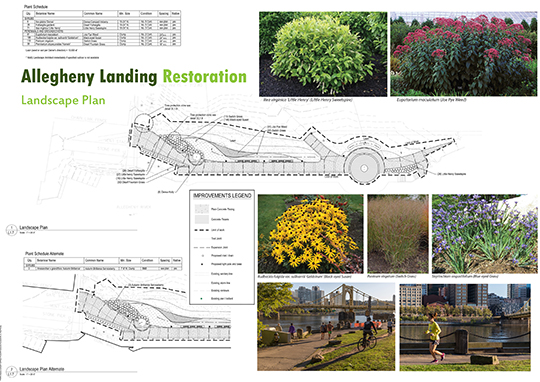Sewer authority encouraged to look at green solutions to combat overflows
NOVEMBER 19, 2015–Community leaders from across Allegheny County, including Riverlife, Clean Rivers Campaign, BikePGH, Pittsburgh Parks Conservancy, and Mayor Peduto’s chief of staff Kevin Acklin, gathered at Allegheny Landing this morning to respond to the Allegheny County Sewer Authority (Alcosan)’s proposal to build miles of new sewer tunnels over the next decade.
Alcosan’s plan is in response to federal regulators requiring the authority to reduce overflows of the city’s existing combined sewer system, and could require construction sites several acres in size along the city’s riverfronts to install sewer drop shafts at the cost of several billions of dollars.
Clean Rivers Campaign unfurled a tarp over 100 feet in diameter on the Allegheny Landing lawn to illustrate the size of the proposed drop shaft tunnels. Clean Rivers also closed off a majority of Allegheny Landing with yellow caution tape to signify the size of the proposed construction site.
Some background about Allegheny Landing and why the Alcosan proposal could have a significant impact on the park as well as riverfront parks on the North Shore, Strip District and in Lawrenceville:
Allegheny Landing opened to the public in 1984 and was one of Pittsburgh’s first riverfront parks. It has seen its share of wear and tear over the decades, so the park is undergoing a restoration led by public-private partners that will bring it up to modern standards for use.
Next spring, the renovation will include the addition of rain gardens to manage stormwater runoff before it flows into the combined sewer system. By implementing a simple plan of native plants and permeable soils, these rain gardens will slow the flow of stormwater rolling down this slope before it reaches the sewer drain and eventually the river. The project is co-led by Riverlife and the City of Pittsburgh, and the rain gardens are generously funded by The Pittsburgh Foundation, Garden Club of Allegheny County, and Friends of Allegheny Landing.
Green solutions like this can be seen in other places throughout the downtown riverfronts. Whether it’s the bioswale landscape in Point State Park or the privately-financed stormwater landscape at Rivers Casino’s North Shore amphitheater, Pittsburgh is beginning to embrace the concept of using our public open space landscapes to do the dirty work of stormwater management. These landscapes are beautiful and enhance the enjoyment and recreation of trail and park users every day..jpg)
Riverlife joins other community leaders in encouraging Alcosan to look at green landscape solutions for its riverfront public open spaces instead of building more gray infrastructure. Working with public-private partners to implement green solutions whenever possible, Pittsburgh could be a national model for controlling stormwater while protecting the investment that has been made to build our riverfront parks.
Photos from top: (1) Pittsburgh UNITED’s Revered Rodney Adam Lyde welcomes the crowd. (2) A tarp laid out by Clean Rivers Campaign illustrates the size of the proposed drop shaft holes along the riverfronts. (3) View of Allegheny Landing from the Andy Warhol Bridge. (4) Riverlife’s proposal for rain gardens to be installed next year at Allegheny Landing, in an effort to combat stormwater runoff using native plantings. (5) Reverend Lyde introduces Riverlife’s Stephan Bontrager to speak to the crowd. Photo by Pittsburgh UNITED; all others by Riverlife.

